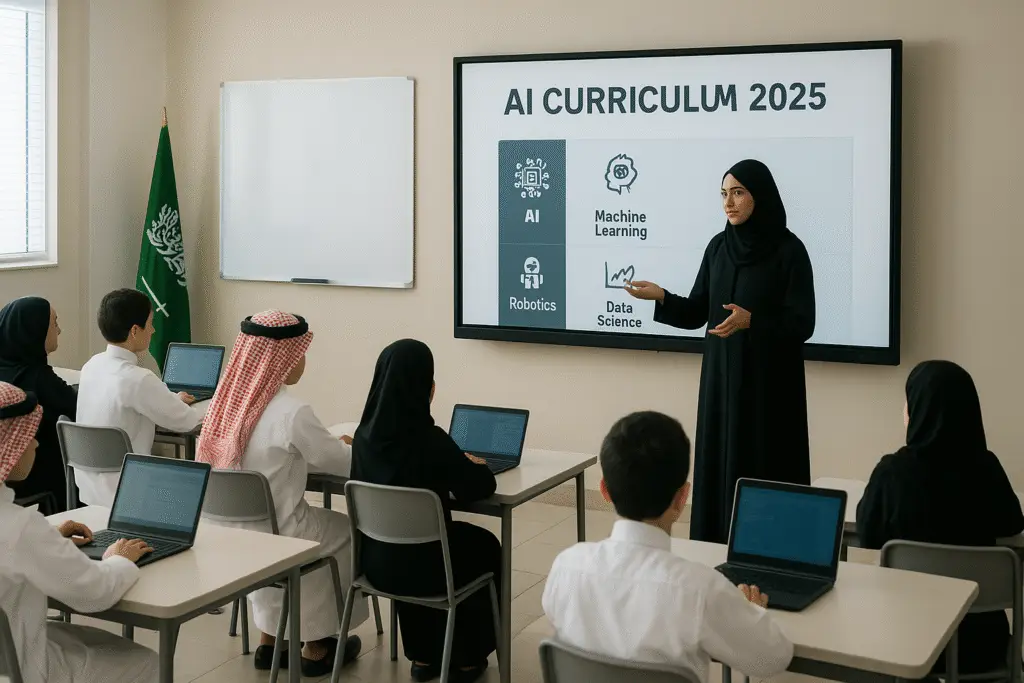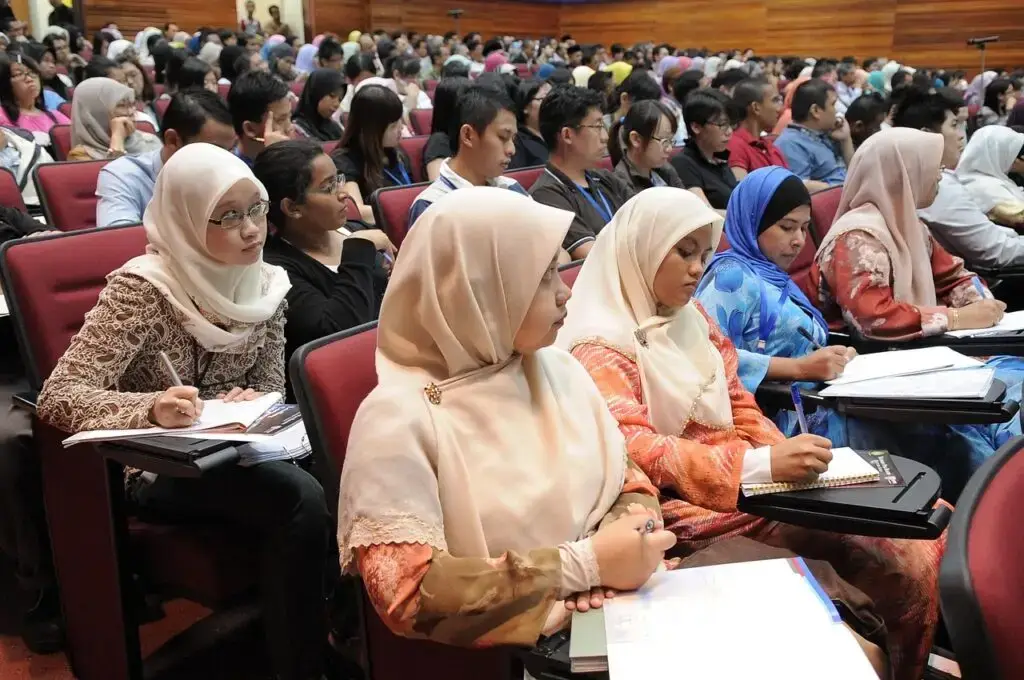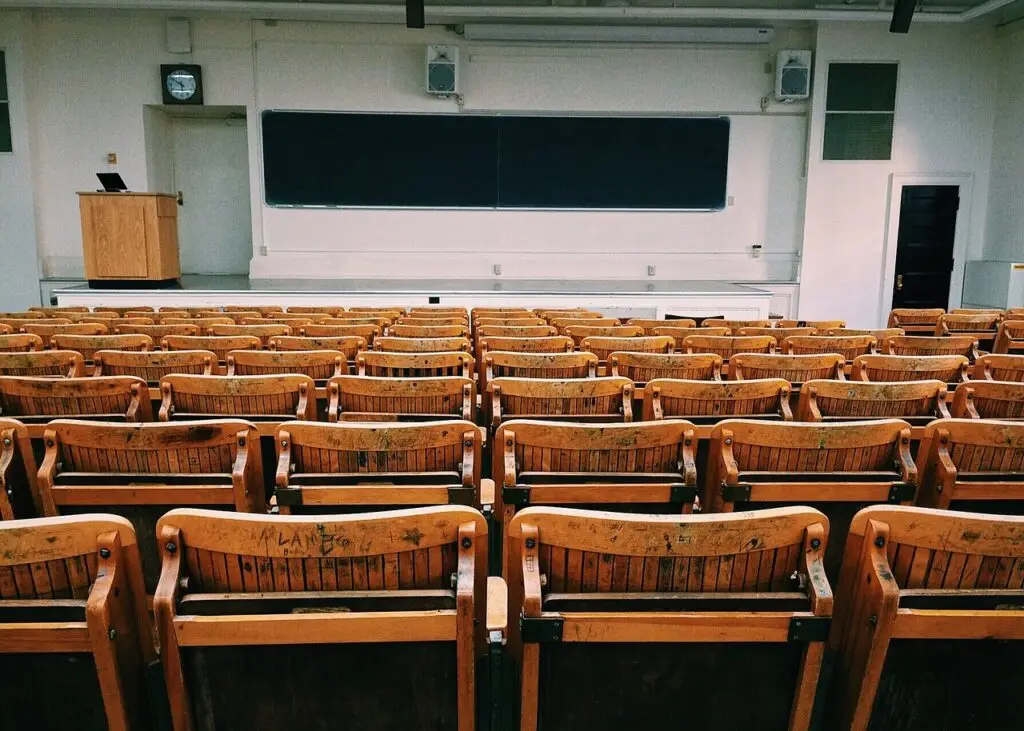
Saudi Arabia AI Curriculum 2025
The Saudi Arabia AI curriculum marks a historic shift in the country’s education system. With the Ministry of Education introducing artificial intelligence in Saudi schools, the academic year 2025 is poised to transform the way students learn, preparing them for careers aligned with Vision 2030. The new Saudi school system integrates a digital curriculum in Saudi schools, smart learning tools, and AI-based subjects to nurture innovation, problem-solving skills, and future career readiness.
Saudi Arabia Education Vision 2030 and AI Integration
The Saudi Arabia education vision 2030 emphasizes diversification of skills, modernization, and global competitiveness. Putting AI in the classroom is in line with general national agendas to power up the knowledge economy. By bringing the AI courses into the Saudi schools, the policymakers are trying to co-create a generation that could lead in the emerging technologies, like those of machine learning and robotics, as well as data science.
Why AI in Saudi Education Matters
- Encourages future skills education in Saudi Arabia.
- Prepares students for careers in AI and the future.
- Promotes classroom innovation in Saudi Arabia through the use of smart technologies.
- Supports long-term goals of building a tech-based learning ecosystem in Gulf countries.
Check the blogs’ monetization process
Digital Curriculum in Saudi Schools
The digital curriculum in Saudi schools is the foundation of this education reform. Online resources and interactive AI tools, as well as projects based on simulations, will now be available to the students.
Features of the New Digital Curriculum
- AI modules tailored for different grades.
- Machine learning courses for kids at introductory levels.
- Integration of student career prep in AI subjects.
- Use of tech-based learning in Gulf countries to inspire regional competitiveness.

AI Courses in Saudi Schools: What Students Will Learn
The artificial intelligence in the Saudi schools’ curriculum introduces age-appropriate learning pathways. Starting with exposure to code at a young age through to sophisticated AI tools, Saudi Arabia’s new school plan is designed so that all students leave school with future-ready skills.
AI Subjects for Students
- Introduction to AI (primary level)
- Coding and Robotics (middle school)
- Machine Learning and Data Science (high school)
- AI and Future Careers for Students (career counseling)

Classroom Innovation in Saudi Arabia: Smart Learning Revolution
The introduction of AI in Saudi classrooms ensures that smart learning in Saudi Arabia becomes the standard. Smartboards, AI-powered skill assessment tools, and adaptive learning mobile apps are installed in the classrooms. If you want to read the article, AI Trends 2025
Impact of AI on Students
- Personalized learning pathways.
- Real-time feedback and performance analysis.
- Improved digital literacy and problem-solving skills.
- Stronger alignment with future careers in AI and technology.
Education Reform in Saudi Arabia: Policy Changes
Saudi Arabia is seeking to modernize its education sector by emulating the world trends, but remaining loyal to local needs. The Saudi Arabia education policy changes focus on:
- Implementing AI in Saudi education as a mandatory subject.
- Enhancing teacher training in AI-driven teaching methods.
- Aligning curricula with future skills education in Saudi.
- Introducing the latest school curriculum updates across public and private schools.
Check Details here by clicking these UNESCO Education Policy Updates
How AI is Taught in Schools
How Taught in Schools The how AI is taught in schools is a mixture of theory and practice. Students are encouraged to apply AI to solve real-world challenges.
Teaching Methods
- Interactive coding platforms.
- AI-powered tutoring systems (similar to Khan Academy AI tutor models).
- Group projects involving machine learning courses for kids.
- Gamified AI-based learning applications.
(External Source: World Economic Forum: Future of Jobs Report)
Tech-Based Learning in Gulf Countries: Regional Competitiveness
The technological learning in the Gulf countries has gained momentum over the past few years, and Saudi Arabia is at the forefront of its AI-based education changes. By 2025, the new school plan in Saudi Arabia will make other neighboring countries look up to it in order to modernize education.
Advantages for the Region
- Shared expertise across Gulf countries.
- Regional AI hubs and collaborations.
- Better-prepared workforce for future digital economies.
FAQs on Saudi Arabia AI Curriculum 2025
What is the Saudi Arabia AI curriculum?
The Saudi Arabia AI curriculum is a new education framework that integrates artificial intelligence subjects into the Saudi academic year 2025, ensuring students learn future-ready skills.
How will AI impact Saudi students?
AI provides personalized learning, career guidance, and classroom innovation in Saudi Arabia, helping students adapt to future careers in technology.
When will the Saudi school year 2025 begin?
According to the Saudi Arabia Ministry of Education update, the 2025 school reopening in Saudi Arabia will follow the revised Saudi school calendar 2025, with AI courses introduced from the start of the academic year.
What subjects are included in the AI curriculum?
The AI subjects for students include coding, robotics, data science, machine learning, and AI career counseling.
Is AI education part of Vision 2030?
Yes, the Saudi Arabia education vision 2030 prioritizes future skills education in Saudi Arabia, with AI being central to building a knowledge-based economy
Conclusion
The Saudi Arabia AI curriculum for 2025 represents one of the most significant Saudi Arabia education changes in decades. Incorporating artificial intelligence into the programs of the Saudi schools, implementing the digital curriculum in Saudi schools, and changing policies, the Kingdom provides its youth with the opportunities to be trained in competition to compete in the world.. As the new Saudi school system develops, students will be more prepared to study enhanced AI and future careers, promote innovation, and ensure the country has enough space in the digital economy.

